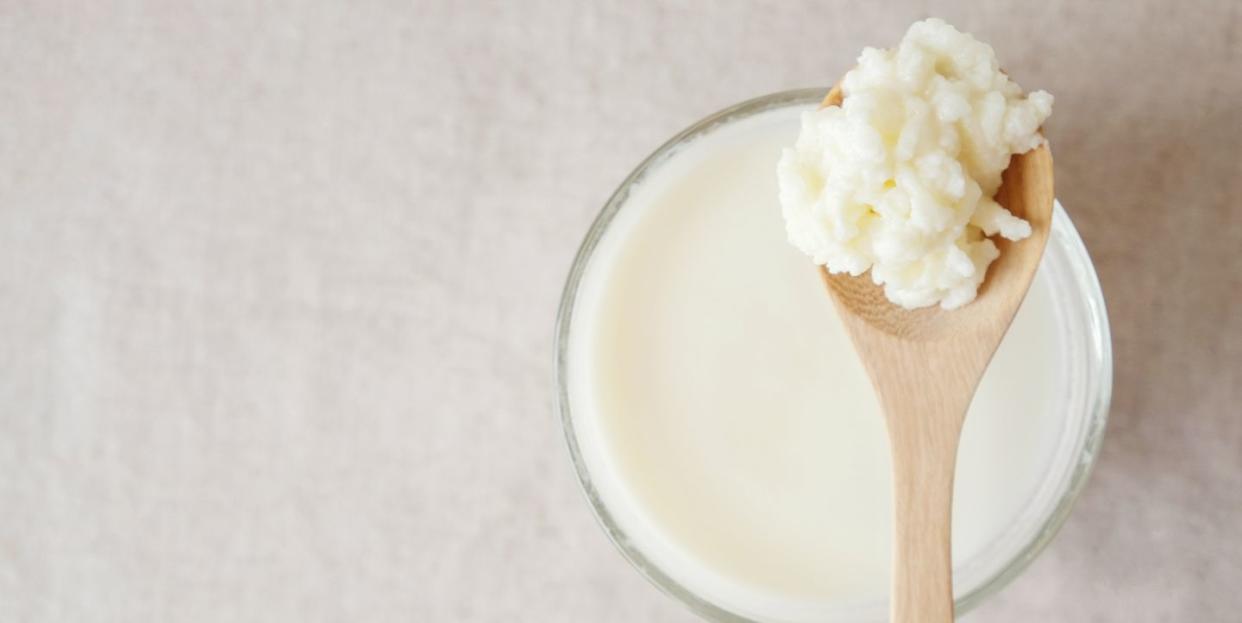Is kefir really good for you?

Anyone worth their weight in superfoods has heard of kefir. The superfood du jour is a healthy, fermented drink with a similar consistency to yoghurt but a more tart, sour taste.
High in nutrients and probiotics, kefir is thought to be beneficial for digestion and gut health.
We talk to Dr. Clare Morrison, GP at online doctor and pharmacy MedExpress about kefir:
What is kefir?
Kefir is a fermented milk drink that resembles yoghurt but has a thinner consistency. The drink, which originated in the mountain region between Asia and Europe, has a sour, tart taste and a slight ‘fizz’ due to the fermentation process.
One cup (250ml) of whole milk kefir usually provides:
Calories: 33
Protein: 8.3 grams
Fat: 7.5 grams
Carbs: 11 grams of carbs
Calcium: 333 milligrams
Magnesium: 28 milligrams
Potassium: 383 milligrams
B12: 0.7 micrograms
How to make kefir
Traditionally, kefir is made by adding a live culture of yeast and bacteria, called kefir ‘grains’, to cow’s milk and leaving it to ferment at room temperature in a glass jar or bowl for around 24 hours. Afterwards, the grains are strained and transferred to a fresh jar of milk to be used again for a new batch, and the strained kefir is ready to drink.
Health benefits of kefir
Kefir has been associated with the following health benefits:
Rich in essential nutrients, such as magnesium and potassium
Improves digestion and gut health
Improves bone health and lowers risk of osteoporosis
Has antibacterial properties
Low lactose
Support weight loss
Reduces inflammation.
Is kefir good for you?
The reason kefir is so popular is down to the ‘good bacteria’ it contains. The specific microorganisms found in the drink are said to support digestive health and prevent the growth of harmful bacteria in the intestines.
‘Our guts contain countless billions of bacteria, mainly in the small intestines and colon,’ Dr. Clare Morrison, GP at online doctor and pharmacy MedExpress explains. ‘They’re vital in helping digest our food properly, absorb nutrients, break down harmful chemicals, train the immune system, and prevent excessive inflammation. For optimal gut health, these bacteria need to be sufficiently diverse, and include healthy varieties, such as Lactobacillus and Bifidobacterium.’
‘Fermented foods, such as kefir, tempeh, miso, kimchi and sauerkraut, are particularly good at promoting gut health since they’re an excellent source of Lactobacillus, which converts sugars and carbohydrate into lactic acid. This helps kill off unhealthy bacteria, preserving the food, and also gives it a tangy flavour. Studies have confirmed that these foods favourably alter the types of bacteria in the gut and countries where these foods form part of the staple diet have relatively low rates of obesity, diabetes and bowel cancer.’

However, it is important to remember that the studies are relatively limited and still ongoing, which is why some experts remain divided on the subject.
‘Some evidence shows that probiotics can have a positive effect on our body, helping to manage the symptoms of conditions like irritable bowel syndrome (IBS), inflammatory bowel disease, and some liver conditions,’ says Dr Luke Powles, a GP for Bupa Health Clinics. ‘However, we don’t yet know whether taking probiotic supplements or eating probiotic-rich foods like kefir can help as the research is still currently ongoing.’
Still, most agree that kefir is unlikely to cause any harm – and for those taking long-term antibiotics or with a weakened immune system, they could prove especially beneficial, says Dr. Morrison. ‘They’re helpful if you've taken antibiotics since they replenish healthy bacteria that will have been destroyed whilst treating the infection.’
However should always speak to a nutritionist or healthcare professional before embarking on a new routine – especially if you're taking medication which could be affected.
Last updated: 30-10-2020
You Might Also Like


